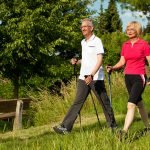If you are well aware of the importance of getting physical activity regularly but have never managed to get yourself into a steady routine of working out, you are hardly alone. According to the Centers for Disease Control and Prevention, more than 75 percent of Americans fail to meet the minimum recommendations for exercise. The good news, however, is that it is not too late for you to begin, even if you are well into middle age. New research suggests that you can live a longer life as long as you eventually become active.
The study, which took place at the United States National Cancer Institute in Bethesda, Maryland, found that people who had been sedentary until their 40s and 50s and then started regular exercise routines slashed their risk of early mortality considerably.1Saint-Maurice, Pedro F.; et al. “Association of Leisure-Time Physical Activity Across the Adult Life Course With All-Cause and Cause-Specific Mortality.” JAMA Network Open. 8 March 2019. Accessed 17 March 2019. http://jamanetwork.com/journals/jamanetworkopen/fullarticle/2727269. These results are based on an investigation that included more than 315,000 men and women who were members of AARP, which used to be known as the American Association of Retired Persons, a nonprofit organization open to anyone 50 or older.
The subjects reported an estimate of hours per week they spent exercising throughout their lives broken down by age from 15 to 18, 19 to 29, 30 to 39, and 40 to 61. Then, the researchers examined these numbers against their medical records. Not at all surprisingly, the analysis showed that the participants who had been working out all through their lives had a 36 percent lower risk of death during the study period than their peers who were never physically active.
The surprise came when the focus turned to those who had been sedentary in their younger years and first began exercising in their 40s or 50s. This group had a 35 percent reduction in the risk of early mortality over the non-exercisers—almost exactly the same benefit as those who were always active.
In addition to an overall drop in mortality risk, the volunteers who began exercising during middle age specifically benefitted from a drop in their chance of developing two of the most serious, potentially deadly conditions, cardiovascular disease and cancer. The rate of death from heart disease plummeted 43 percent in those who started exercising later in life compared to their counterparts who did no exercise. And the rate of death from cancer dropped 16 percent among the late exercisers. What’s more, both of these reductions in disease risk were in line with those of the subjects who had always been physically active.
While the investigation did not establish a threshold for the amount of exercise a person needed to reach these benefits, it did determine that the participants who worked out the most at any age had a reduced risk of dying from any cause. Of course, this is not the first research that shows an association between regular physical activity and an increased lifespan, but it breaks new ground in analyzing the effects of exercise in different periods of adult life.
This is especially crucial since there are so very many people who do not even come close to the U.S. Department of Health and Human Services recommended guidelines for moderate to vigorous exercise for 150 minutes per week. And if you’re part of this large, mainly sedentary group, take the results of the current study to heart and use them to get motivated. Don’t wait any longer to start getting active; you will reap long-term benefits no matter what age you are. If you haven’t yet hit middle age, don’t wait because lots of diseases, such as diabetes and stroke, are taking their toll on an ever-younger population and exercise will lower your risk.
By the same token, if you are already past middle age, you still stand to benefit greatly from regular workouts. A 2011 study at University Hospitals in Geneva, Switzerland showed that exercising to music in the senior years is linked to improved balance, which can help prevent potentially traumatic falls. If you’ve been physically active all along, you’re in the best possible position because it has become a good habit for you that you can continue for the rest of your life. And if you’re thinking that maybe it’s too late for you and that you no longer can physically exercise, remember what Jon Barron says in Lessons from the Miracle Doctors:
“Anyone can exercise. If all you can do is hobble around the bed using a walker, you can start with one trip around the bed the first day, two the next, three the third, and so on. If you’re confined to bed or a wheelchair, work your upper body. Extend your limits. Move or die.”
References
| ↑1 | Saint-Maurice, Pedro F.; et al. “Association of Leisure-Time Physical Activity Across the Adult Life Course With All-Cause and Cause-Specific Mortality.” JAMA Network Open. 8 March 2019. Accessed 17 March 2019. http://jamanetwork.com/journals/jamanetworkopen/fullarticle/2727269. |
|---|











